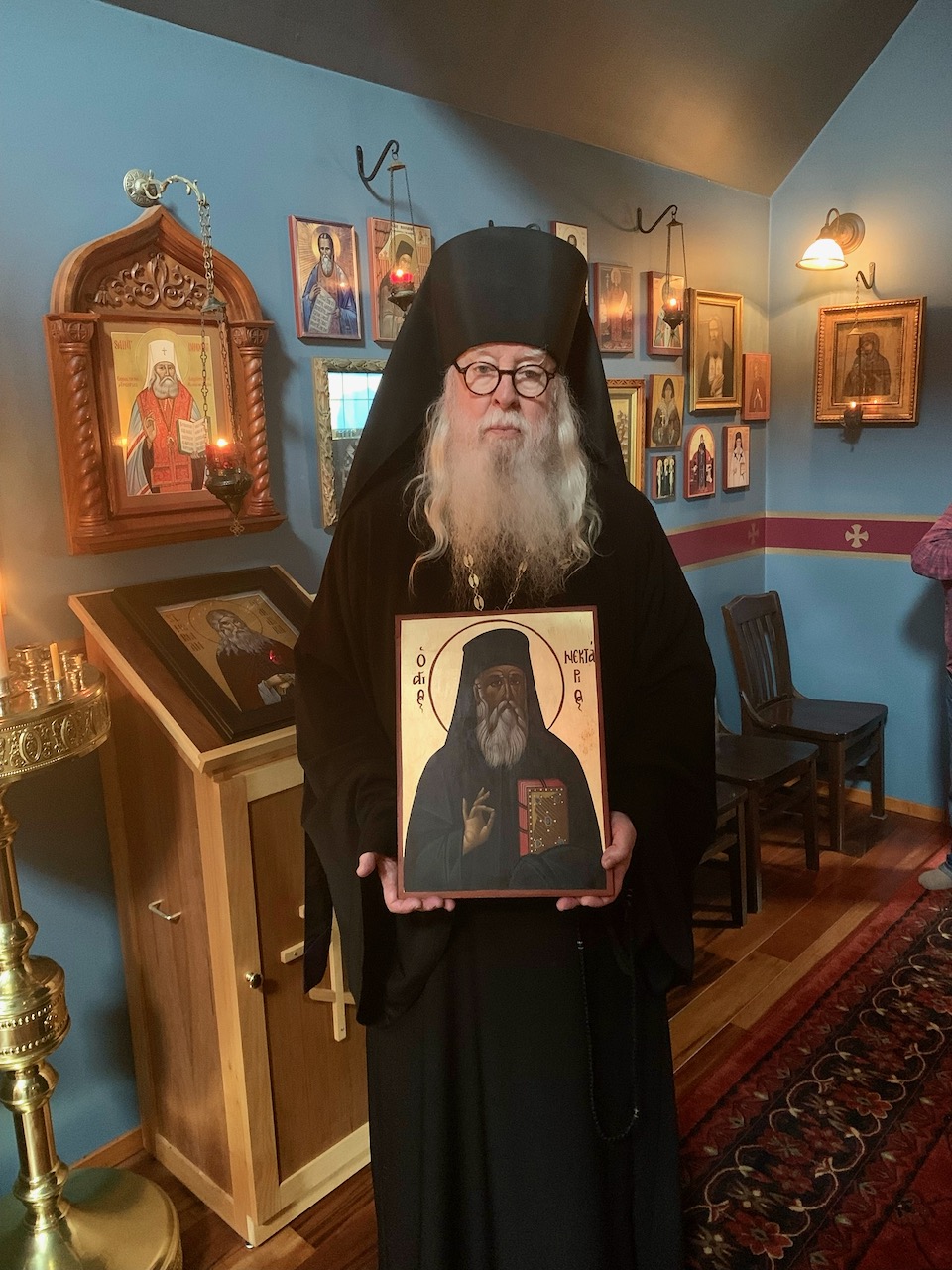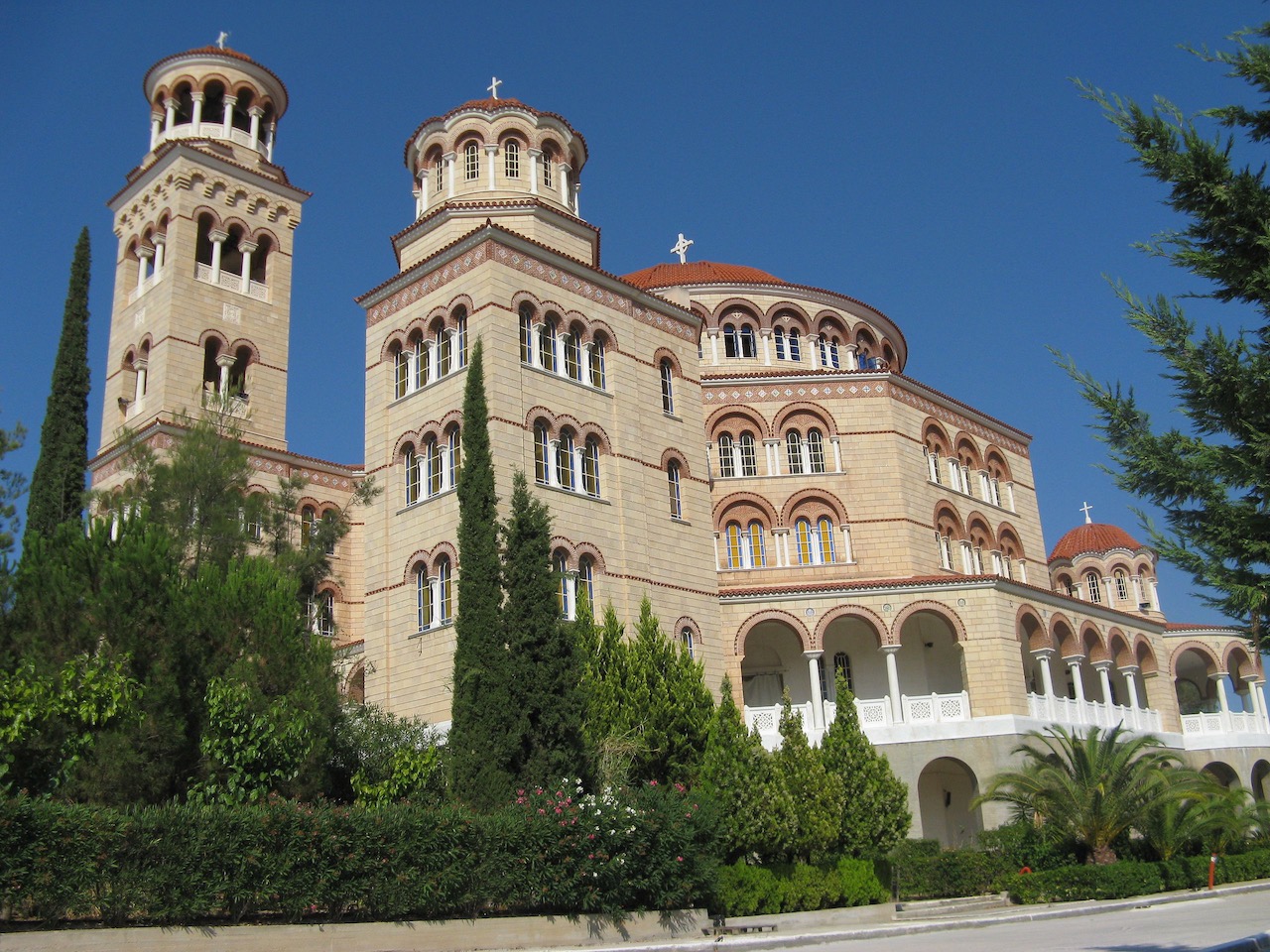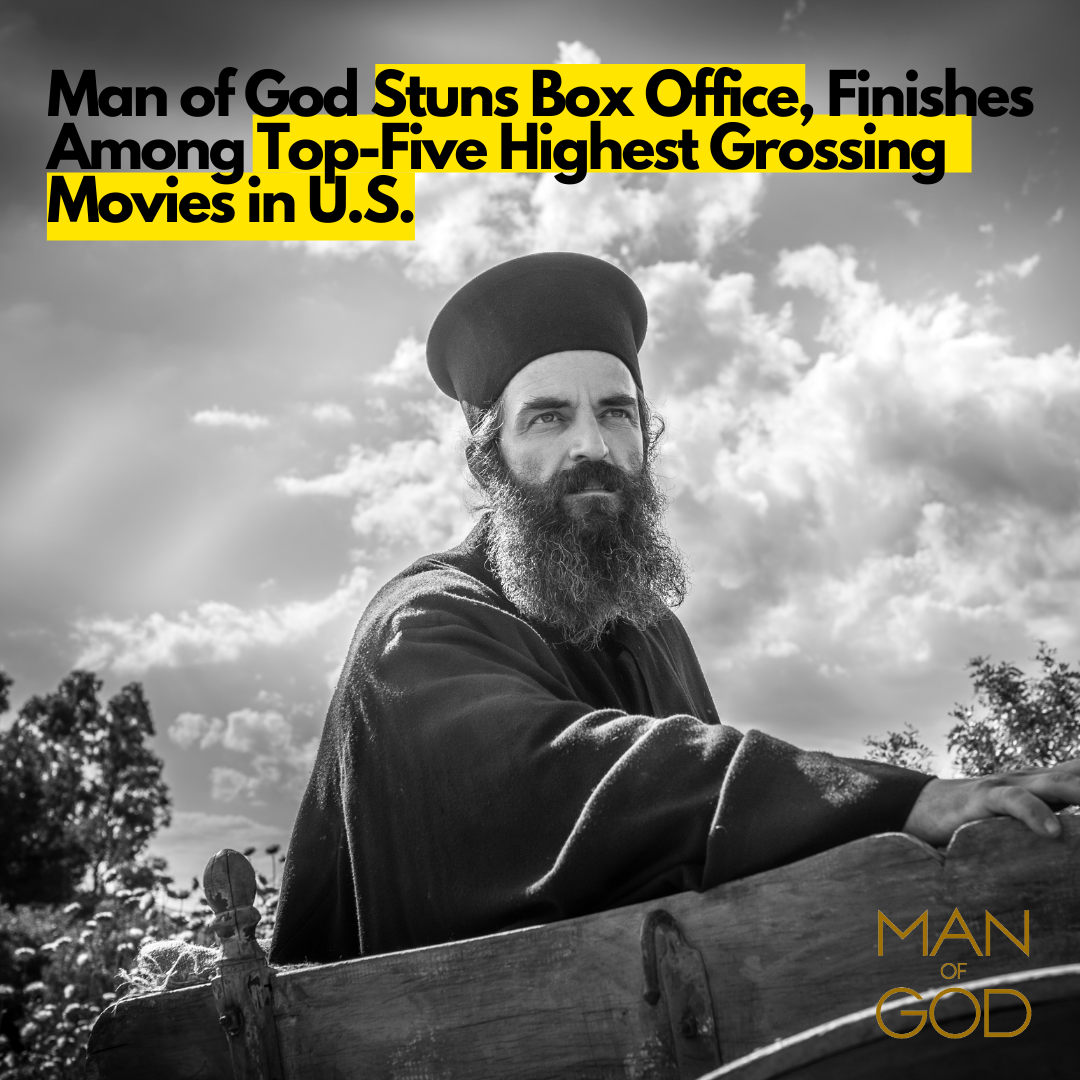Cooperating in the Devil’s Attack Against the Church

There is a new movie that is having a great impact upon the whole world, a movie that I was blessed to see while in Northern Idaho, as the speaker for the Women’s Tea at Saint John the Baptist Orthodox Church in Post Falls, Idaho. Man of God is a profound movie not only because it tells the story of one of the greatest saints in history, but because it demonstrates the powerful impact suffering can have on behalf of the Church. Saint Nektarios was Metropolitan of the throne of Pentapolis, a man of great humility, and perhaps one of the most beloved and honored bishops of the Church.
The movie, which was nine years in production, is one that every Orthodox Christian should see, for it demonstrates the dangers that often befall Christ’s Church. That the Church of Christ is hated by the Evil One should be of no surprise. That the devil has often warred against the Church from within is a reality that we must all be aware of, for the best way to attack the integrity and holiness of the Church, is from within. That the Church is the Hospital of the Soul, is it any wonder that the physicians of this hospital would be the target for the Devil’s attacks? That some bishops of the Church should be the target of hatred and rage against Christ, only makes sense, even though we know from scripture that “the gates of hell shall not prevail against the Church” (Matthew 16:18-19).
.
The love and admiration of the people for Metropolitan Nektarios turned to his disadvantage. Because of the spotless life that he led, because of his holy sermons, and his inspiring writings, he stood out among his fellow bishops, all Metropolitans of the See of Alexandria. They did not like Saint Nektarios because he was different from them. For this reason these bishops slandered him to Patriarch Sophronios, saying that he had his eye upon the Patriarchal Throne, because he had this “false show of piety,” as they called it. Not wanting to recognize his true virtue and unmatched spiritual beauty, they said that all his virtue was only a show so that he would be considered holy by the people. They accused him of using his popularity with the people to dethrone the Patriarch. Since he was so popular with the people, the Patriarch was easily convinced that his position as Patriarch was in danger. Little did they understand that Saint Nektarios was not a proud man, and not ambitious, as they were. He was, unlike them, not interested in positions of power and glory. The Saint made no attempt to justify himself but placed all his hope in the promise of Christ who has said: “Blessed are you when men revile you and persecute you and utter all kinds of evil against you falsely on my account (Matt. 5:11)”.
Because they were threatened by him, they suspended their fellow bishop as Metropolitan of Pentapolis. The Patriarch, who had been a very great “friend” of Metropolitan Nektarios, wrote an ambiguous letter of suspension, which later became the cause of much scandal, saying that for “reasons known to the Patriarchate” he was suspended from the Metropolis of Pentapolis, but that he was allowed to remain at the Patriarchate and to eat at the common table. Saint Nektarios was essentially deprived of all means of lodge and shelter.
Although he was not defrocked per say, nor was he suspended from ecclesiastical functions, he was taken away from his throne to be without position. He humbly endured these slanders and the suspension from his throne, but because he was popular with the people there were grumblings and intrigues that arose, with the people demanding to know why he was suspended.
Not wanting to cause further disturbance in the Church of Alexandria, Saint Nektarios secretly left for Greece, but the letter of dismissal he received only complicated matters, since those against him knew that they would be embarrassed if the truth were known about the true matter of his dismissal. Therefore, they sent letters, both anonymous and signed, to influential people in Greece, slandering him as being unethical and immoral, and that this was the reason he was suspended from his position.
Alone and despised, he embarked for Athens. He faced many days without food, as he kept nothing for himself and gave all the little that he had to the poor. When the Saint appeared in Athens with this paper of suspension, many believed there must have been a cause for his suspension. Because he was removed, “for reasons known to the Patriarchate,” many chose to believe he must truly be an evil man. When evil rumors go around about someone, outsiders to the situation usually fall victims of believing them. Thus, both the State and the Church authorities refused to give him a position in the Church of Greece. Saint Nektarios was left without means of support, a stranger amongst his own, without lodging, without food, without even the most simple means of subsistence.
Every day he would go to the office of the Minister of Religion so that something might be done for him and every day he was turned away. He thought about going to Mount Athos for monastic retreat but gave up the idea as he wanted to help others more than he wanted to help himself.
This movie will be shocking to many Orthodox Christians, for seeing bishops of the Church behaving in such an evil manner, even to the point of becoming sycophants to fellow bishops, desiring as they did to enjoy favor among them, is truly scandalous. But if we look closely at such behavior, we will see ourselves, for we have often been guilty of slandering others for the sake of gaining favor from those who have power and authority over us. If we are truthful, most of us have been guilty of slandering another for self promotion and potential personal gain.
Upon the death of Saint Nektarios, a cloth that had been covering him in his hospital bed, was placed upon the bed of a man sharing the small room. The man had been in a terrible accident, and had lost the ability to walk, or even to move his arms. As the saint reposed in the Lord, the man stood up, completely healed. Shortly after his repose, many miracles happened throughout the land, and upon hearing proof of his sanctity, he was reappointed as Metropolitan of Pentapolis, and within a short period of time, glorified as a saint of the Universal Church.
Saint Nektarios is one of the Patron Saints of our monastery, primarily because of the experience I had with him. In 1989 I made a pilgrimage to the Holy Mountain of Athos, and while in Greece I made my way to the Island of Aegina, so I could pray before his holy relics. During my visit to the convent founded by him, there was a special service asking for his heavenly intercession. I wrote on a piece of paper that was placed on a platter that was set under his holy relics, asking that he heal me of my dyslexia. I walked away, having been healed.
With love in Christ,
Abbot Tryphon

Thursday March 24, 2022 / March 11, 2022
Third Week of the Great Lent. Tone six.
Great Lent. By Monastic Charter: Food without Oil
St. Sophronius, patriarch of Jerusalem (638).
St. Euthymius, Bishop of Novgorod, wonderwoker (1458).
Venerable Alexis of Goloseyevsky Skete, Kiev Caves (1917).
Venerable Patrikius confessor (1933).
New Hieromartyr Basil, priest (1937).
Venerable Sophronius, recluse of the Kiev Caves (13th c.).
Hieromartyr Pionius of Smyrna and those with him: Asclepiades, Macedonia, Linus and Sabina(250).
Translation of the relics of Martyr Epimachus of Pelusium to Constantinople (250).
St. Sophronius of Vratsa (1815) (Bulgaria).
Venerable George, abbot of Sinai, brother of St. John Climacus (7th c.).
Venerable John Moskhos (622).
Venerable Oengus the Culdee, compiler of first Irish martyrology (824) (Celtic & British).
Venerable George the New, wonderworker of Constantinople (970) (Greek).
St. Theodora, queen of Arta, wife of Despot Michael II of Epirus (1275) (Greek).
Hieromartyr Eulogius, metropolitan of Cordova (859).
Martyrs Trophimus and Thalus of Laodicea (300) (Greek).
Hieromartyr Constantine, in Kintyre.

The shrine church dedicated to Saint Nectarios on the island of Aegina.

The Scripture Readings
Isaiah 11:10-12:2
10 “And in that day there shall be a Root of Jesse,
Who shall stand as a banner to the people;
For the Gentiles shall seek Him,
And His resting place shall be glorious.”
11 It shall come to pass in that day
That the Lord shall set His hand again the second time
To recover the remnant of His people who are left,
From Assyria and Egypt,
From Pathros and Cush,
From Elam and Shinar,
From Hamath and the islands of the sea.
12 He will set up a banner for the nations,
And will assemble the outcasts of Israel,
And gather together the dispersed of Judah
From the four corners of the earth.
13 Also the envy of Ephraim shall depart,
And the adversaries of Judah shall be cut off;
Ephraim shall not envy Judah,
And Judah shall not harass Ephraim.
14 But they shall fly down upon the shoulder of the Philistines toward the west;
Together they shall plunder the people of the East;
They shall lay their hand on Edom and Moab;
And the people of Ammon shall obey them.
15 The Lord will utterly destroy the tongue of the Sea of Egypt;
With His mighty wind He will shake His fist over the River,
And strike it in the seven streams,
And make men cross over dry-shod.
16 There will be a highway for the remnant of His people
Who will be left from Assyria,
As it was for Israel
In the day that he came up from the land of Egypt.
A Hymn of Praise
12 And in that day you will say:
“O Lord, I will praise You;
Though You were angry with me,
Your anger is turned away, and You comfort me.
2 Behold, God is my salvation,
I will trust and not be afraid;
‘For Yah, the Lord, is my strength and song;
He also has become my salvation.’ ”
Genesis 7:11-8:3
11 In the six hundredth year of Noah’s life, in the second month, the seventeenth day of the month, on that day all the fountains of the great deep were broken up, and the windows of heaven were opened. 12 And the rain was on the earth forty days and forty nights.
13 On the very same day Noah and Noah’s sons, Shem, Ham, and Japheth, and Noah’s wife and the three wives of his sons with them, entered the ark— 14 they and every beast after its kind, all cattle after their kind, every creeping thing that creeps on the earth after its kind, and every bird after its kind, every bird of every sort. 15 And they went into the ark to Noah, two by two, of all flesh in which is the breath of life. 16 So those that entered, male and female of all flesh, went in as God had commanded him; and the Lord shut him in.
17 Now the flood was on the earth forty days. The waters increased and lifted up the ark, and it rose high above the earth. 18 The waters prevailed and greatly increased on the earth, and the ark moved about on the surface of the waters. 19 And the waters prevailed exceedingly on the earth, and all the high hills under the whole heaven were covered. 20 The waters prevailed fifteen cubits upward, and the mountains were covered. 21 And all flesh died that moved on the earth: birds and cattle and beasts and every creeping thing that creeps on the earth, and every man. 22 All in whose nostrils was the breath of the spirit of life, all that was on the dry land, died. 23 So He destroyed all living things which were on the face of the ground: both man and cattle, creeping thing and bird of the air. They were destroyed from the earth. Only Noah and those who were with him in the ark remained alive. 24 And the waters prevailed on the earth one hundred and fifty days.
Noah’s Deliverance
8 Then God remembered Noah, and every living thing, and all the animals that werewith him in the ark. And God made a wind to pass over the earth, and the waters subsided. 2 The fountains of the deep and the windows of heaven were also stopped, and the rain from heaven was restrained. 3 And the waters receded continually from the earth. At the end of the hundred and fifty days the waters decreased.
Proverbs 10:1-22
Wise Sayings of Solomon
10 The proverbs of Solomon:
A wise son makes a glad father,
But a foolish son is the grief of his mother.
2 Treasures of wickedness profit nothing,
But righteousness delivers from death.
3 The Lord will not allow the righteous soul to famish,
But He casts away the desire of the wicked.
4 He who has a slack hand becomes poor,
But the hand of the diligent makes rich.
5 He who gathers in summer is a wise son;
He who sleeps in harvest is a son who causes shame.
6 Blessings are on the head of the righteous,
But violence covers the mouth of the wicked.
7 The memory of the righteous is blessed,
But the name of the wicked will rot.
8 The wise in heart will receive commands,
But a prating fool will fall.
9 He who walks with integrity walks securely,
But he who perverts his ways will become known.
10 He who winks with the eye causes trouble,
But a prating fool will fall.
11 The mouth of the righteous is a well of life,
But violence covers the mouth of the wicked.
12 Hatred stirs up strife,
But love covers all sins.
13 Wisdom is found on the lips of him who has understanding,
But a rod is for the back of him who is devoid of understanding.
14 Wise people store up knowledge,
But the mouth of the foolish is near destruction.
15 The rich man’s wealth is his strong city;
The destruction of the poor is their poverty.
16 The labor of the righteous leads to life,
The wages of the wicked to sin.
17 He who keeps instruction is in the way of life,
But he who refuses correction goes astray.
18 Whoever hides hatred has lying lips,
And whoever spreads slander is a fool.
19 In the multitude of words sin is not lacking,
But he who restrains his lips is wise.
20 The tongue of the righteous is choice silver;
The heart of the wicked is worth little.
21 The lips of the righteous feed many,
But fools die for lack of wisdom.
22 The blessing of the Lord makes one rich,
And He adds no sorrow with it.
